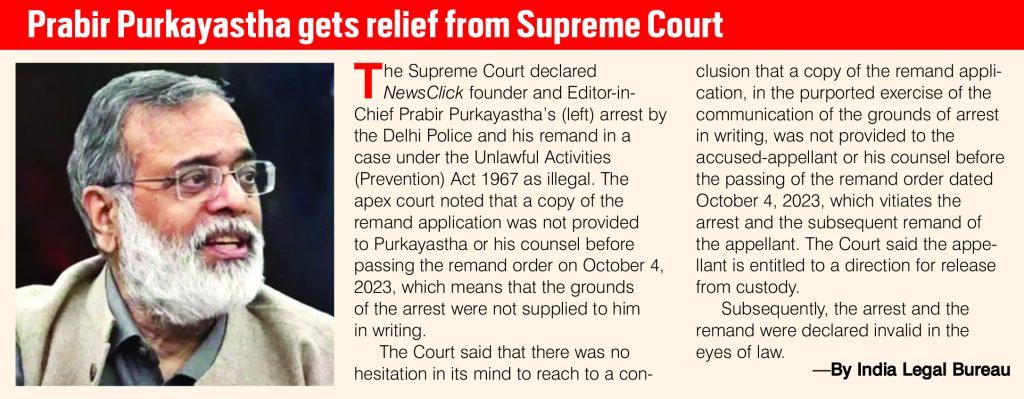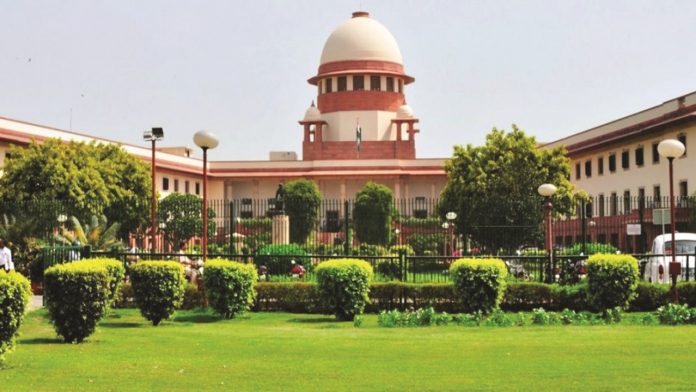Two Supreme Court benches have blunted the ED’s ultimate weapon: power to arrest under the PML Act. This marks a restoration of due process for the targets of the investigative agency
By Sujit Bhar
Through May 16 and 17, two different benches of the Supreme Court of India were virtually toying with the facade of supposed legality and invincibility that the government, the Enforcement Directorate (ED) and the entire legal cell of the powers-that-be had built around the Prevention of Money Laundering Act (PMLA) and its now dreaded Section 19.
In the first instance, the bench of Justices Abhay S Oka and Ujjal Bhuyan tore to shreds the ED’s supposed all-powerful arrest power under the Act, saying that the ED officers just cannot arrest an accused using Section 19 of the PMLA after the Special Court has taken cognizance of the money laundering complaint. The bench made it clear that if the ED wants custody of the accused it has to separately apply to the Special Court. There is just no automatic arrest route.

In the other instance, the bench of Justices Sanjiv Khanna and Dipankar Datta reserved its judgment on Delhi Chief Minister Arvind Kejriwal’s petition challenging his arrest by the ED in the Delhi excise policy case, but not before clarifying that Kejriwal was at liberty to apply for normal bail from the trial court in the meantime. Kejriwal is out campaigning on interim bail and is supposed to surrender before the Court on June 2.
In this case, the ED made a last-ditch wild attempt, saying that it had found “personal direct chats” between Kejriwal and a hawala operator it did not name. This claim was contested by Kejriwal’s lawyers. The bench, before which the ED had not been able to place a shred of evidence for so long, seemed to have remained unfazed at this last-minute charge by the ED’s lawyers and rose.
The preparation for this had been happening for a while. It was on May 16 that the ED informed the Court that a complaint against Aam Aadmi Party (AAP) was in the pipeline. It had talked about “direct evidence” of Kejriwal “demanding” Rs 100 crore as kickbacks. The lawyers, including Solicitor General Tushar Mehta, had supposedly thought that the bench would be shocked at this “expose”, but that did not happen. Instead, the bench allowed Kejriwal to approach the trial court for normal bail.
A Long Nail
The first verdict was a long nail in ED’s coffin, so to say. The bench made it clear that after cognizance is taken (by the Special Court) of the offence punishable under Section 4 of the PMLA based on a complaint under Section 44, the investigating agency and its officers are powerless to exercise powers under Section 19 to arrest the person shown as accused in the complaint.
The ED has to follow normal routes towards possible custody. It has to start with summons. But if the accused appears following the summons, the only route left to the ED is applying to the court for custody. The top court also clarified that in case the Special Court allows custody, it has to pass an order on the application after recording brief reasons.
The bench made it clear that while hearing the (ED’s) application, the Court may permit custody only if it is satisfied that custodial interrogation is required even though the accused was never arrested under Section 19.
The Wording of the Law
Before going any further, one must look back at the exact wording of Section 19. The sub-section (1) states:
“If the Director, Deputy Director, Assistant Director or any other officer authorised in this behalf by the Central Government by general or special order, has on the basis of material in his possession, reason to believe (the reason for such belief to be recorded in writing) that any person has been guilty of an offence punishable under this Act, he may arrest such person and shall, as soon as may be, inform him of the grounds for such arrest.”
Reading carefully, one realises how the agency has been intentionally and persistently misinterpreting this law. The first qualifying statement in this subsection is: “…has on the basis of material in his possession, reason to believe (the reason for such belief to be recorded in writing) that any person has been guilty…”
Hence not only must the agency have enough proof on its hands, but this has to be in written form and not an assumption. So far the agency, with little in its hands by way of what can be categorised as “proof”, had been threatening the accused with the spectre of a dehumanising arrest and public loss of face. For any person with some standing in society, this had been a threat that never went down well. More often than not, the hours of so-called interrogation by the ED, broke the back of the accused, and in the end, the ED misused the Section and arrested him/her anyway. Which brings to the fore the statement “…he may (emphasis provided) arrest”. This is obviously being taken out of its context. The option to arrest has been heavily qualified by law.
Finally, “…and shall, as soon as may be, inform him of the grounds for such arrest.” This is a part that has not been followed, using the “…as soon as may be” clause.
Many of the detainees have not been informed in detail.
The Other Directive
The judgment of the bench did not leave it at that. The bench also made it clear that once a complaint under Section 44(1)(b) of the PMLA is filed, it will be governed by Sections 200 to 205 of the Code of Criminal Procedure. It added that none of those provisions are inconsistent with the PMLA. The Court also made it clear that before any arrest can be made, if at all, the Court can only issue a summons and not a warrant.
There were few more technical issues that the bench dealt with, which, in their totality, took the teeth out of this artificially morphed Section 19. The issue of “guilty till the accused proves himself/ herself innocent” has no legs to stand. The general principle of law, in which an accused is “innocent till proven guilty”, is back on track.
As for Kejriwal, the issues and in-court developments around the PMLA’s Section 19 will only strengthen his case. One has to remember that Kejriwal has only challenged the legality of his arrest, he has personally not asked for bail.
India’s strong judicial system is striking back at misuse of law.


